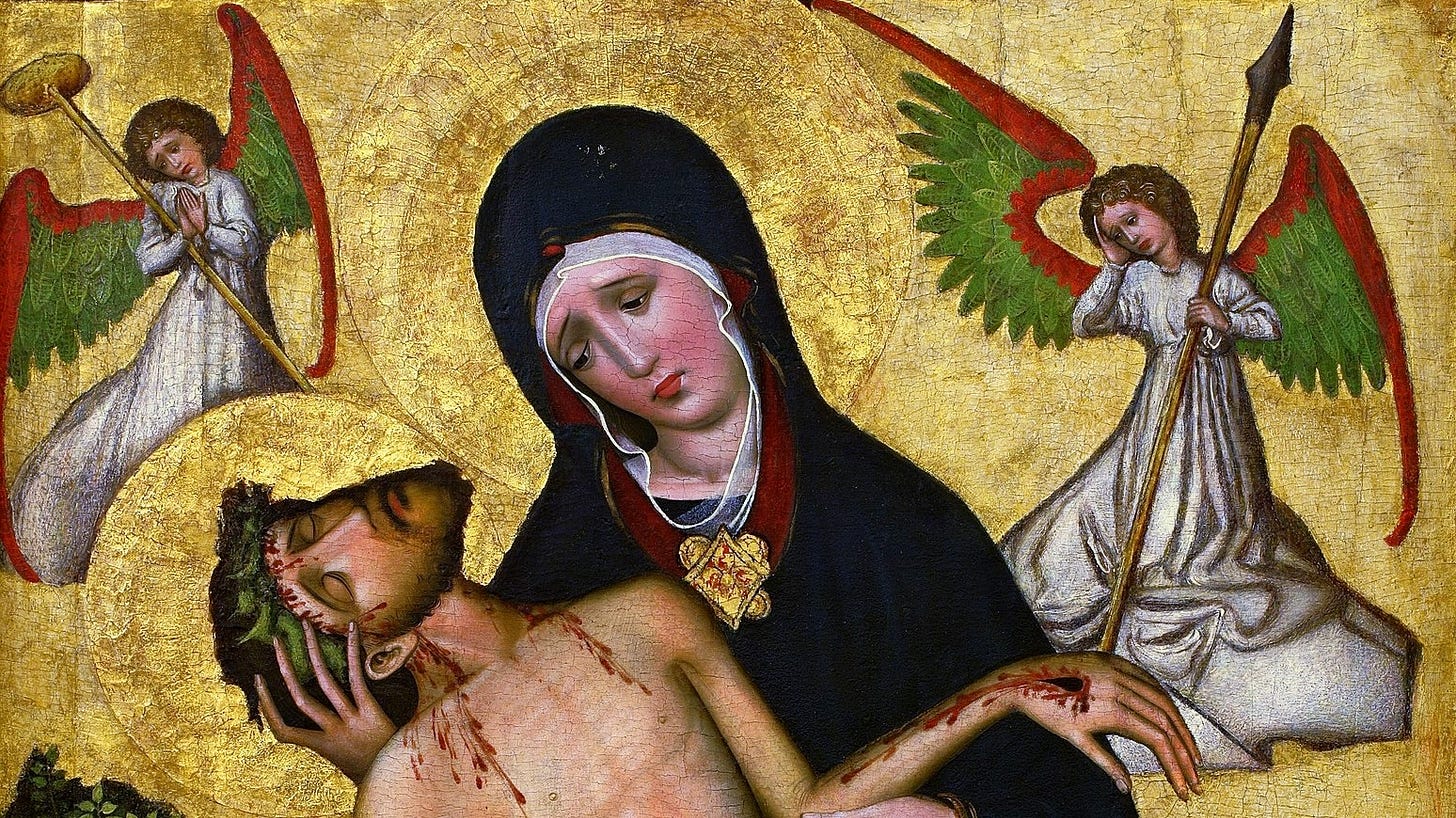Our Lady's consent to Christ's sacrifice
She was not like any other bereaved mother: her sufferings were not only greater, but different in kind.

She was not like any other bereaved mother: her sufferings were not only greater, but different in kind.
Editor’s Notes
The following reflection on the active role of Our Lady in the sacrifice of Christ is drawn from The History of the Sacred Passion by Father Luis de la Palma SJ.
It considers the sorrow of Our Lady on receiving the body of her Son from the Cross. But far from portraying her simply as a mourning mother, de la Palma presents her sorrow as that of one who had consciously and lovingly consented to her Son’s redeeming sacrifice, and offered it, with him, to the Eternal Father. This presentation recalls that of the holy Machabean mother and her role in the martyrdom of her seven sons (2 Mach. 7).
De la Palma himself was a Spanish Jesuit of the late sixteenth and early seventeenth century. Born in Toledo in 1559, Father de la Palma entered the Society of Jesus at the age of sixteen and went on to serve with distinction as a theologian, spiritual director, and religious superior. His works were especially esteemed for their clarity, depth, and fidelity to the method of Saint Ignatius.
This particular text was intended as both a devotional narrative and a guide for meditation—what Father de la Palma describes as a companion to the Spiritual Exercises. Rich in insight and devotion, it distils the traditional Catholic understanding of Our Lord’s Passion and the place of Our Lady within it.
The work was edited by Father Henry James Coleridge SJ, who praises de la Palma as belonging to the golden age of Spanish Catholic literature, and expressed the hope that it deepen both the knowledge and love of Jesus Christ crucified—and to assist those who meditate on his sufferings and death.
The Body of our Saviour is taken down from the Cross and laid in the Sepulchre
From
The History of the Sacred Passion
Fr Luis de la Palma
Chapter XLVIII, pp 389-393
Edited by Fr Henry James Coleridge SJ, 1872
The arms of Mary
The Blessed Virgin was there waiting to receive Him into her arms, nor could there be any more fitting or solemn receptacle than these.
When kings return as conquerors from battles, and especially if they have fought valiantly for their own persons and the liberation of their kingdom from some grievous yoke and servitude, they are received by their vassals with great demonstrations of honour, and public rejoicings, with dances, acclamations, triumphal arches, and all the other inventions with which men have contrived to acknowledge publicly and make honourable and magnificent the triumph of their kings, and thus to employ in their service the goods, the honour, and the liberty which they confess that they have received from them.
Our King returned from fighting with the world and the devil, with sin and with death. He had fought valiantly in His own Person, and received many wounds in His body, and had given up His life in the quarrel; He had come forth as a conqueror, and had left all His enemies and ours routed and broken. The fruit of this victory was that we were set free from the power of darkness, and had passed into the kingdom of light and the hope of eternal life.
O Catholic Church!—Kingdom chosen by the Son of God, people conquered by His blood!—with what honour, with what pomp and display, with what solemnity and triumph, with what acclamations, with what songs and praises, with what triumphal arches, with what splendid decorations, with what gifts of price didst thou receive thy King when He descended from the Cross? Of a truth thou didst find nothing else wherewith to receive Him but the arms of His Mother!
O souls desirous to honour Jesus Christ and to celebrate His triumphs, acknowledge this grace that God has done to you by laying up all His treasures in this Virgin, that in her and through her you might honour your King and Redeemer! O precious pearl of the Church and honour of the human race! Supply, O Lady, our poverty, and open thine arms, and thy bosom, and thy heart, and receive Him within them, after having redeemed us, Him Who when He came to redeem us thou didst worthily receive into thy most pure and holy womb!
Her intelligence of the mystery
Who shall say that the Blessed Virgin was ashamed of her Son because He had died with so much infamy on the Cross, when the Apostle found nothing else in which He could glory save in this self-same Cross?
The Blessed Virgin, moreover, had all the more reason to glory therein, seeing that she had received through it even more graces and favours than the Apostle. Thou, O Lady, knewest then the mystery of the Cross better than the Apostle, even after the Gospel had been preached and received. Thou, in thy great humility, knewest better how to esteem and be thankful for the graces of God than any other creature, thou knewest well that all these graces had been gained for thee by thy Son upon the Cross.
When thou didst see Him descend from it, wounded and pierced, disfigured and become as it were a leper and dead for thee, what didst thou feel, what words didst thou utter, with what love and longing desire didst thou receive Him?
‘Give to me,’ thou didst say, ‘give to me my Lord!’
Addressing her dead Son
When thy most precious Son, O Lady, spoke to thee from the Cross, not quite to kill thee or Himself with emotion, He did not call thee Mother, but He said, ‘Woman, behold thy Son.’
Tell us now, O Blessed Virgin, by your precious love, if now that He was dead, and that thou wast alone to feel that grief and tenderness, if thou didst call Him Son?
When He was of the age of twelve years, and thou didst lose Him for three days and seek Him with such anxiety, thy motherly heart could not contain itself when thou foundest Him in the Temple, nor refrain from calling Him Son, saying,1 ‘My Son, why hast Thou done so?’
Now that He is lowered into thy arms, dead of a death of torments, how was it possible for thee to restrain thy love and hinder thyself from exclaiming, ‘My Son, how is it that Thou comest to me thus? O sirs, give me my Son and my Redeemer!’
Jesus in His Mother’s arms
The Blessed Virgin repressed with gravity and modesty the sobs which rose from her heart, whilst tears flowed abundantly from her eyes. She seated herself at the foot of the Cross, she received into her lap the dead body of her Son, and sustaining Him in her arms, let His head recline upon her virginal breast.
Alternately casting her eyes upon Him and then raising them to heaven, she became deeply absorbed in devout meditation on the Passion of our Lord, in compassion, in profound and calm contemplation, and the most sublime affections, both of love and grief, which as long as time lasts will be felt concerning this mystery by the faithful and most highly favoured amongst the sons of God.
Colloquy of our Lady
‘My Son,’ she would say, ‘who is it that has done thus unto Thee?’
‘I do not complain, Lord, of those who have taken Thy life, since Thou didst offer it of Thy own will for them through obedience to Thy Eternal Father. O Eternal Father! blessed be Thy providence, and blessed be Thy bounty and Thy love, Who, in order to give life to slaves, hast delivered to death Thy very Son Himself!
‘My Son, these were Thy longings; Thy desires are now fulfilled. These wounds, these sufferings, these nails, and this lance which I now see on Thy body — all these are what Thou hast borne throughout all Thy life in Thy Heart. How couldst Thou live, seeing Thou hadst to bear therein so heavy a cross?
‘Thou hast died, Lord, at the hands of Thy enemies, not as a weak and cowardly man, but as the valiant and courageous die, and as the Son of Him Whose Son Thou art. O Son of the Eternal Father! this was the obedience, this the zeal for the honour of God, this the love for our neighbour, the contempt of all earthly things, the constancy in preaching the truth, and fortitude in coming forth in its defence, which He Who was the true Son of God had to teach in the world.
‘O Eternal God, great in justice and great in mercy! what justice is this which Thou hast executed on Thy beloved Son? And what mercy is this which Thou hast shown to vile and ungrateful slaves?
‘My Son, dost Thou not speak to me? If Thou didst undergo pain and agony when Thou didst enter upon Thy Passion, is it much that I should feel such now that Thou comest forth from it? and if Thou wert so conformed to the will of Thy Father then, I also am conformed to Thine, it is sufficient that Thou shouldst have willed it, in order that I should will it also, and enough that Thou shouldst have felt it, in order that I should also feel it.
O Eternal Father, Who art well pleased and satisfied with the sacrifice of His body which this innocent Lamb has offered Thee! receive likewise that which His afflicted Mother offers Thee in her heart, and from this very day, grant abundant mercy to sinners, since it is for their sakes that Thou hast executed so rigorous justice upon Thy Son.’
Her cooperation
Thus the Blessed Virgin, with a heart pierced with sharpest grief, was rapt in sublimest contemplation, and her Son, Who, but a little season before, being alive, had offered Himself up with burning charity on the arms of a dead Cross, now, being dead, was laid within the arms of His living Mother.
She felt all His sufferings, and offered them also, as far as was her part to do so, for the honour of God and the salvation of men, with all the force of the charity communicated to her by the Holy Spirit.
So well pleasing to God was that love with which, in the midst of so many griefs, the Blessed Virgin strained herself to desire the redemption and salvation of the human race, that, as her Son was made a Mediator and the Redeemer of all mankind, so she also became a mediator and advocate for the same.
Our Lady of Sorrows—Pray for us.
Read Next:
The Maccabean mother’s martyrdom and the link to Our Lady of Sorrows
HELP KEEP THE WM REVIEW ONLINE WITH WM+!
As we expand The WM Review we would like to keep providing free articles for everyone.
Our work takes a lot of time and effort to produce. If you have benefitted from it please do consider supporting us financially.
A subscription gets you access to our exclusive WM+ material, and helps ensure that we can keep writing and sharing free material for all.
(We make our WM+ material freely available to clergy, priests and seminarians upon request. Please subscribe and reply to the email if this applies to you.)
Subscribe to WM+ now to make sure you always receive our material. Thank you!
Follow on Twitter, YouTube and Telegram:
St. Luke ii. 48






